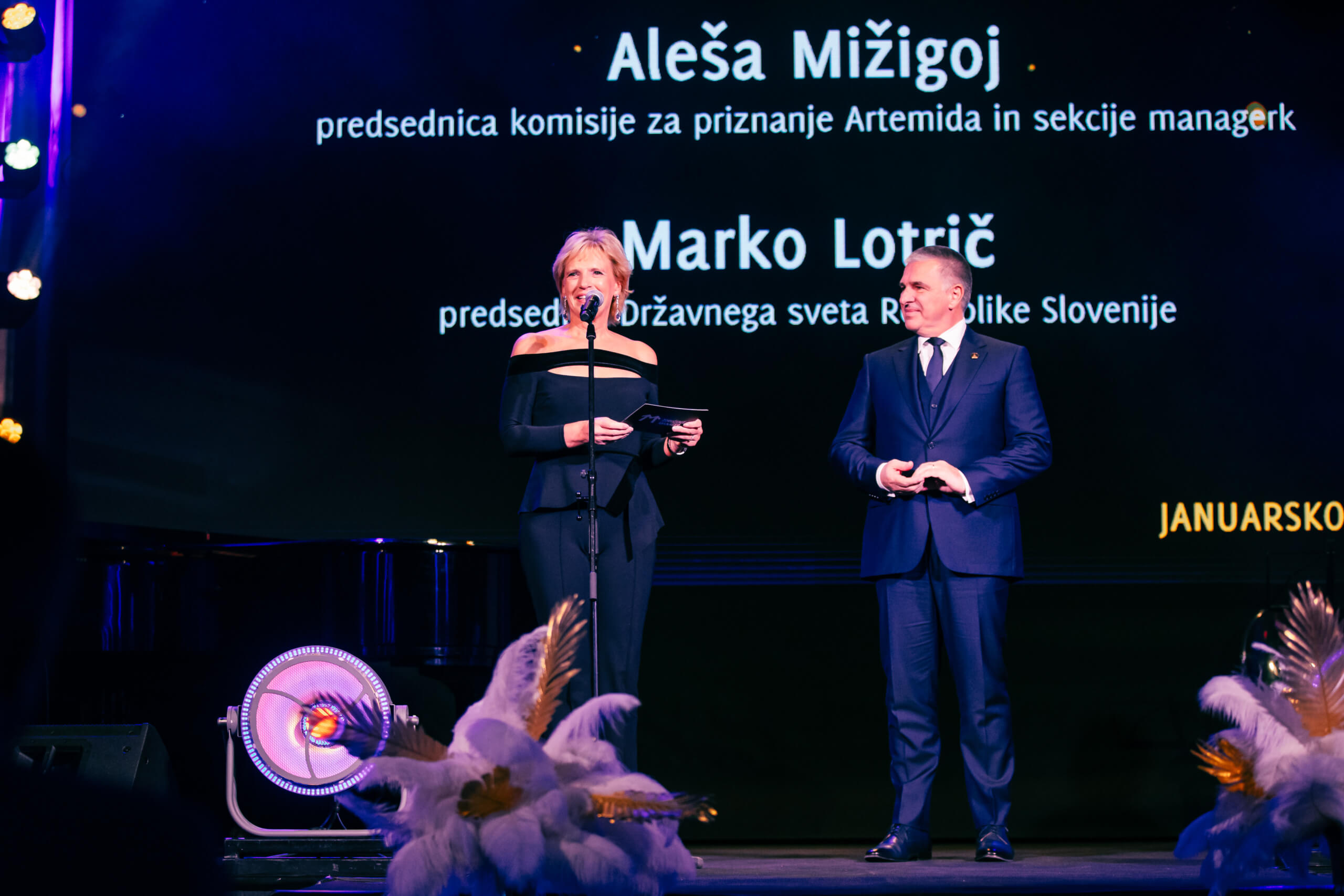“Leadership Is Not About Ego—It’s About Purpose”: Petra Juvančič on Sustainable Leadership
We had the opportunity to have an extensive conversation with Petra Juvančič, Executive Director of the Managers’ Association of Slovenia (MAS) and a member of our confederation. She also commented on the importance of communication and the challenges that leaders face in Europe’s immediate future.
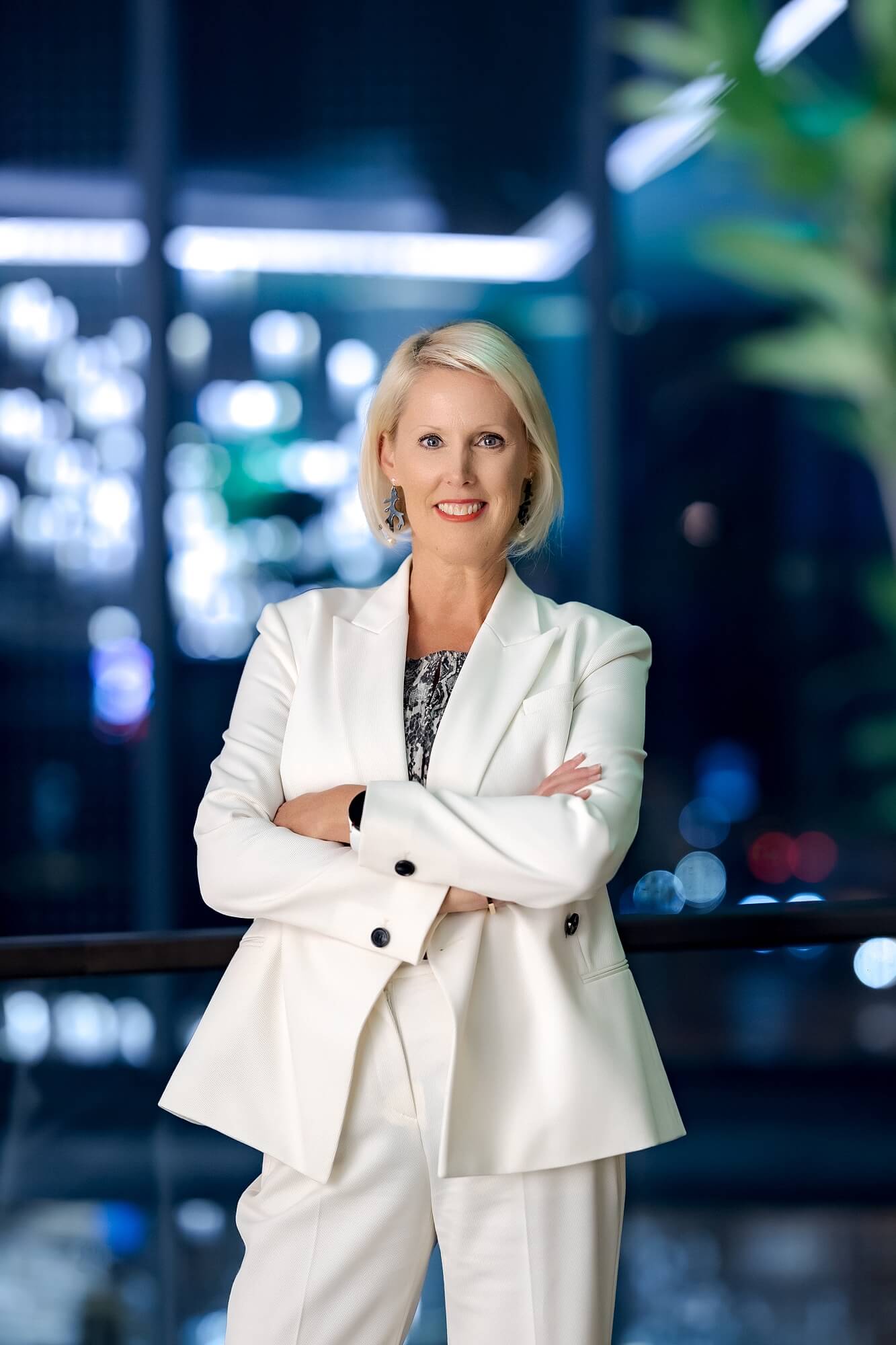
How would you introduce yourself?
Thank you for inviting me to discuss my role at the Managers’ Association of Slovenia—it’s truly an honor.
I’m the Executive Director of MAS and a mum of two. I consider this the most critical role in my life—and I don’t say that as a cliché —and I genuinely learn from my children almost every day, even some lessons and tricks that are surprisingly useful in management.
My professional journey has taken me through media, corporate communications, and strategic leadership — always with a focus on impact, values, cooperation, and dialogue.
I’m working closely with 1,300 top managers and entrepreneurs in Slovenia today.
In MAS we aim to foster a leadership culture that delivers “Good results—in the right way”, as our motto says. And I will be forever thankful that I can also learn a lot from such a great community of ambitious, intelligent, and brave people.
When did you decide to defend the people in leadership positions?
Several reasons, but it happened kind of naturally, very spontaneously. Throughout my career, I have been working with several managers, I’ve learned how crucial leadership can be—not only for business but also for society as a whole.
I also come from a Slovenian municipality, which has always had strong entrepreneurship. I was always interested in business, development, ambition…
In the 1990s, Slovenia became independent, and I belong to a group of believers that we have all the possibilities to become another Switzerland.
What does the Slovenian Managers’ Association do to support managers?
We need to give leaders all our possible support. Especially since the pandemic, they have faced many challenges marked by constant uncertainty and rapid change.
From the perspective of the business environment, one of the top priorities for Slovenian management is creating conditions for lasting competitiveness: a stable and predictable business climate, an encouraging tax policy, de-bureaucratization/deregulation, a more efficient and responsive public administration, and investments in infrastructure, both physical and digital.
We also provide tools and resources for strengthening leadership competencies.
We make surveys about leadership, we follow how developed our leaders are, what are our needs, where are our strengths and opportunities.
Based on all the data, we organise 25 to 30 events a year, some of them educational, sharing knowledge and experience between managers, and some for networking, such as our cultural events. We also have our own MQ magazine, etc.
Throughout the year, we also give several awards to acknowledge the manager of the year, young manager of the year, award for lifetime achievements in the field of management, Artemida for woman leadership…
All these awards matter.
We proudly present our award winners and share their stories, which is very important, especially for the young, who need role models who encourage them.
How is the response to your initiatives in Slovenia?
Our community is engaged and actively discusses important issues with decision-makers. We also try to participate in legislative processes, although we are not engaged in the social dialogue.
When a topic is important to us, we prepare studies, position papers, and promote our views, making sure society hears our voice.
We are quite a prominent and respected organisation in that field. In past years, we prepared a detailed Action plan for higher productivity in Slovenia together with the Ministry of the Economy, University of Ljubljana – School of Economics and Business, and we included top 40 managers from Slovenia.
It was a vital document; however, we still have a lot to do to implement at least some of the suggested measures.
In the last few weeks, the Ministry of the Economy of Slovenia has invited us to participate in a special working group to tackle issues related to excessive bureaucratization. This is an initiative on a EU level.
The European Commission is also implementing “simplification” around the continent. How does being part of CEC European Managers help Slovenian managers with that?
Knowing what is going on at a European level and with other leaders and managers on the continent is crucial. Being part of CEC European Managers allows us to get direct information from Brussels and share what is happening in Slovenia.
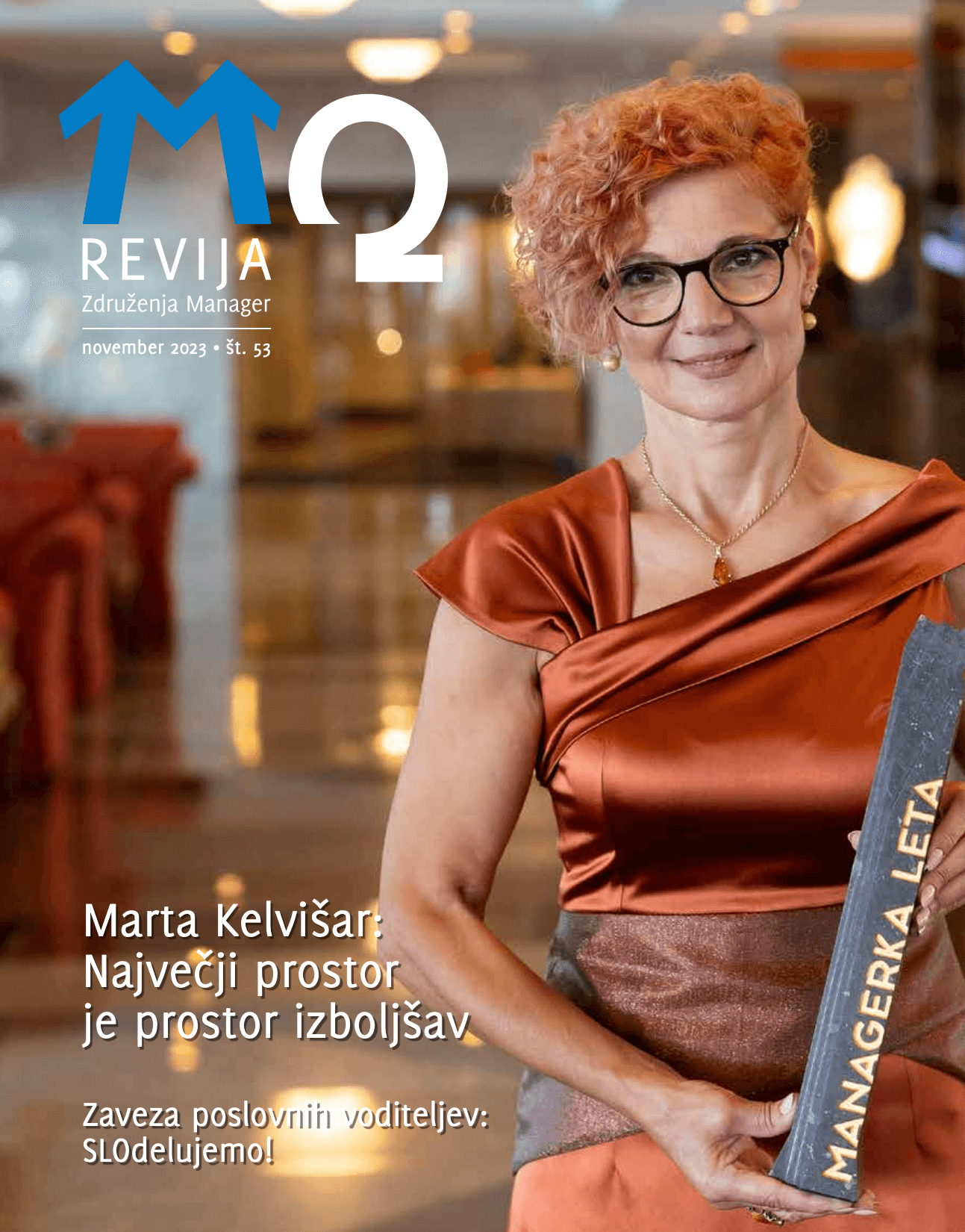
As we heard a lot in the past months after the Draghi report, our focus nowadays is to be more competitive, and Europe needs a united response to achieve this goal.
Competitiveness goes hand in hand with diversity, inclusion, and equity.
Have you ever felt discriminated against as a woman in Slovenia?
Not exactly, although I cannot say we don’t have some challenges. On one hand, I’m proud of my country because it is a very social state – when you give birth, you stay at home for a year and receive a maternity leave compensation.
As a mom, I have to say that sometimes it is hard for us women to find the right balance. But our manager of the year, Marta Kelvišar, once said that in life, we will be working 40 years or more; so, there is time for everything.
On the other hand, women still struggle sometimes; therefore, within the MAS, we have a strong Section of Women Managers and mentorship programs to support women leadership.
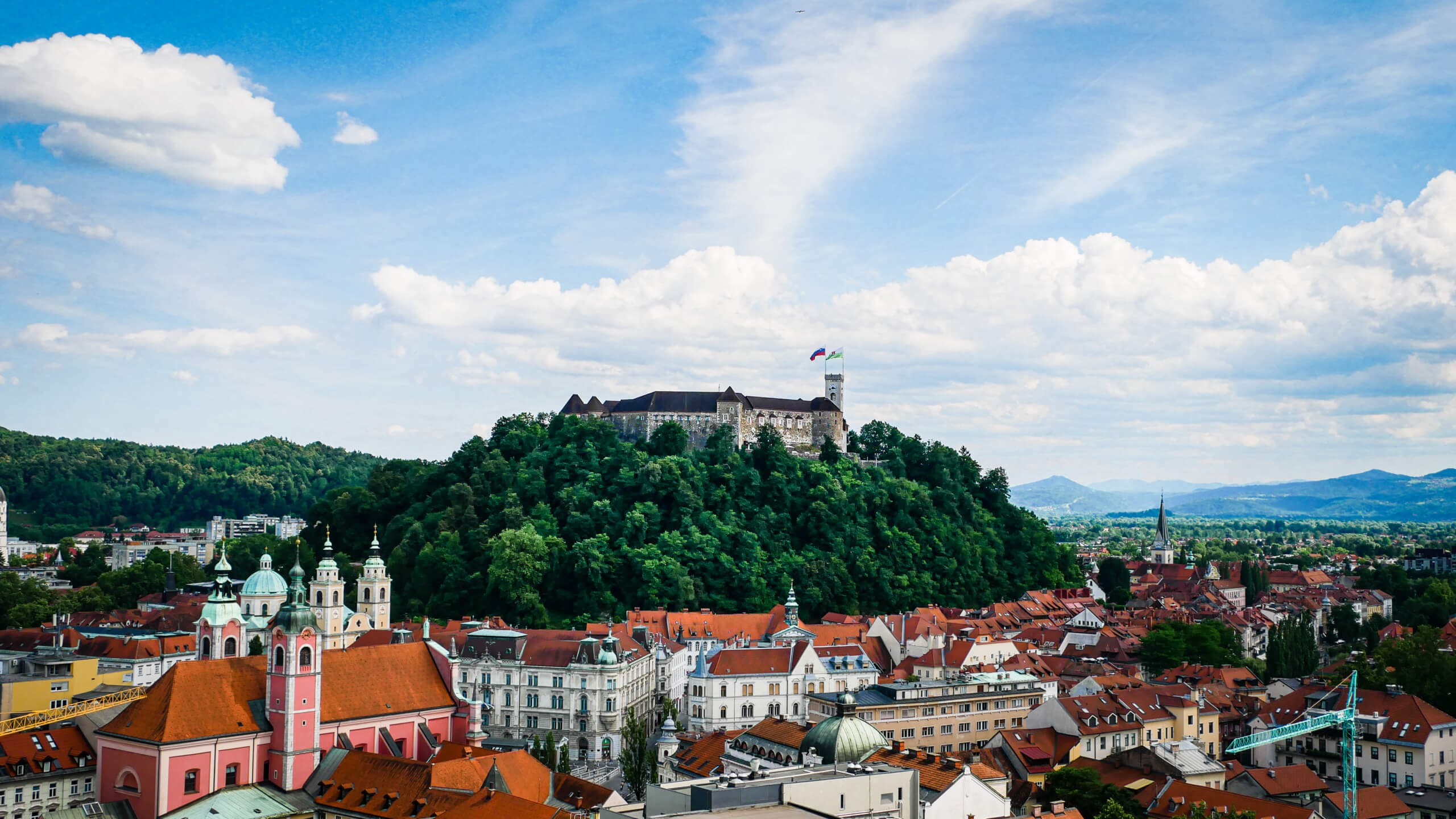
The view of Ljubljana Castle standing on Castle Hill above downtown Ljubljana, Slovenia.
When women managers are interviewed, they are often asked about their role as mothers, which is a question that would not be addressed to male managers…
I don’t feel offended by that. I have two great kids, they are teenagers now and they know how important my work is to me and even know mostly everything about the Slovenian Managers’ Association 😊
How different are the challenges faced by Slovenian managers from those faced by managers in other countries?
From what I read – and I think a read a lot – we actually have a lot of similar challenges.
We all know that people in leadership positions need specific skills and competencies, and this refers to both, whether you come from Brussels, Paris or Ljubljana.
Of course, it also depends on the business environment in different countries and their competitiveness. This brings many different challenges.
What I am asking myself nowadays, is – especially with the new generations (millennials and Gen Z) and everything that’s happening in the world – what modern sustainable leadership is.
If we take a look at some of the leaders in the world, either in business or politics… is that really something that we want? Something that we need? How do we make changes?

According to the latest European Barometer, managers’ priorities (read full article here) have changed and sustainability, diversity or gender equality are no longer at the top, with defence, competitiveness and energy taking over. How do you see these changes?
These changes are logical. The EU has its challenges in global competitiveness, and the focus has changed.
As we all know by now, we are not alone in this world. There is fierce global competition.
We have seen what Donald Trump did when he announced tariffs. On the other hand, I am deeply concerned with the “unbearable lightness” of discussing arming, possible war, 72-hour emergency kits, etc.
I have just read Richard Quest’s words in his interview for the 10th anniversary of the Oslo Business Forum: Times are challenging, and the world as we know it will never be the same again.
Still, I believe this moment offers us a valuable opportunity to reflect on the future of sustainable leadership—one that balances both competitiveness and sustainability.
If our economies are strong, inclusion, diversity, and gender equality will remain long-term trends, even if we focus on being more productive and competitive.
How is global uncertainty affecting business leadership?
I think it brings lots and lots of stress. Let’s just think about the massive blackout in Spain – can you imagine being a company CEO without electricity? And this is just one last example.
We were used once to prepare a five-year strategic plan and we had annual plans, and you had to make some minor adjustments during implementation. Today, you wake up and there’s war, disruptions in the supply chain, power outage, tariffs, etc.
You still need a long-term plan. However, you have to be constantly prepared for short-term adjustments.
I have mentioned Richard Quest before – he said and I agree that it’s the end of the world as we know it.
Nowadays, a leader has to be agile and courageous, provide stability in an unstable environment, trust in people, work in teams, etc.
You’ve led strategic communications in both corporate and association settings—how has that shaped your approach to advocacy and leadership?
With my colleagues we often say “where there’s no communication, there’s a lot of complication”.
I’ve learned it in my PR career that even when you think you have already said it a million times, say it again: repeat, repeat, repeat. It surprises me again and again how important that is.
And it is not just about messaging—it’s about listening, building trust, and creating movements, actions.
Whether in a company or an association, clear and authentic communication is what turns ideas into action and leaders into role models.
However, what is very important in leadership is the awareness that PR or communication cannot be just a perfect façade covering damaged walls and foundations.
That was my function for a while; however, people will find out soon that “the sound and the picture do not match”. You need a purpose, a mission, and fundamental values.
Authenticity is increasingly appreciated in leadership, especially among the young. Communication professionals must help leaders be authentic, articulate a vision, embrace transparency, and engage meaningfully with diverse stakeholders.
What messages do you try to amplify with your work at the MQ Magazine?
We highlight leadership stories that inspire, challenge, and offer new perspectives. Our goal is to amplify voices that drive change, share practical insights, and spark dialogue on the future of business and leadership in Slovenia and beyond.
We are in contact with our members almost daily, we follow what is going on globally, we listen, read and follow influential speakers, visionaries, futurists, etc.
Every edition is shaped by what keeps leaders up at night—from AI to talent shortages to sustainable strategy.
I see the MQ Magazine as part of the traditional media. Nowadays, most of the impact comes from social media and we communicate there a lot. For example, we have a strong business community on LinkedIn. Anyway, everything we do is somehow focused on promoting the “sustainable leadership.”
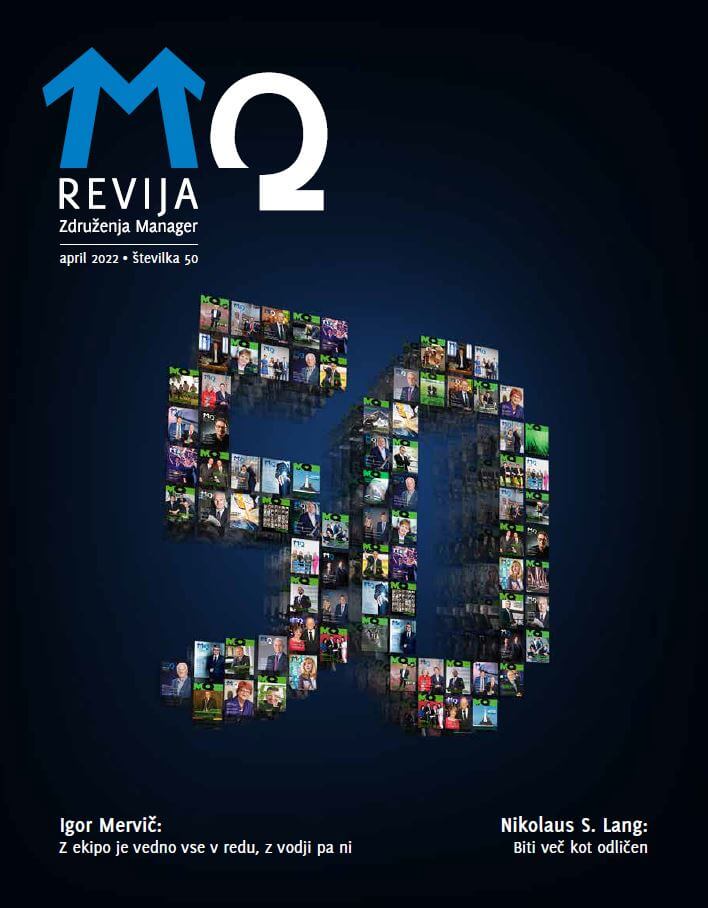
What does “sustainable leadership” stand for?
Sustainable leadership means everything from good corporate governance to managing/leading people with respect and building an inclusive working environment. Basically, it’s all about the right values, and that’s why I consider the MAS motto so important.
You have communication experience in the health sector. How does that experience translate into the managerial world and the workplace well-being?
I have been working in the health insurance sector for so long, and I also have had the opportunity to study other health care systems and their organisation, financing, etc.
Being as realistic as I am, I know many of the health care systems will face very big challenges soon due to demographic trends.
The Slovenian health care system is also different, since we have a pay-as-you-go system that relies on contributions from working populations, which are shrinking, and as a society, we are getting older.
We all know how health is important to all of us and also that a healthy mindset is better for achieving good results.
Organisations that put focus on the well-being of their employees tend to be more resilient, innovative, and productive.
My experience in the health sector has taught me that prevention, early intervention, and supportive environments are key — and the same applies in the workplace. As a manager, this means creating a culture where people feel safe, valued, and motivated.
In health communication, trust is essential. How do you implement trust in your communication strategy?
Everything in the insurance industry is about trust.
Trust is built through consistency, transparency, and delivering on promises.
It is also internally essential to empower people and own their mistakes. Externally, it means speaking clearly, acting responsibly, and always keeping the customer in mind.
What did the international ProPR Award you received in 2018 mean?
I received the information about my nomination via ordinary mail. At the beginning I thought I was being invited to a conference or an event and almost ignored the message. But then I started reading and found out I was nominated.
As it turns out, communication experts noticed my work, and I was granted the recognition. I have to admit, I was honored. It was a beautiful moment, receiving recognition from my professional colleagues. I must be doing something right 😊
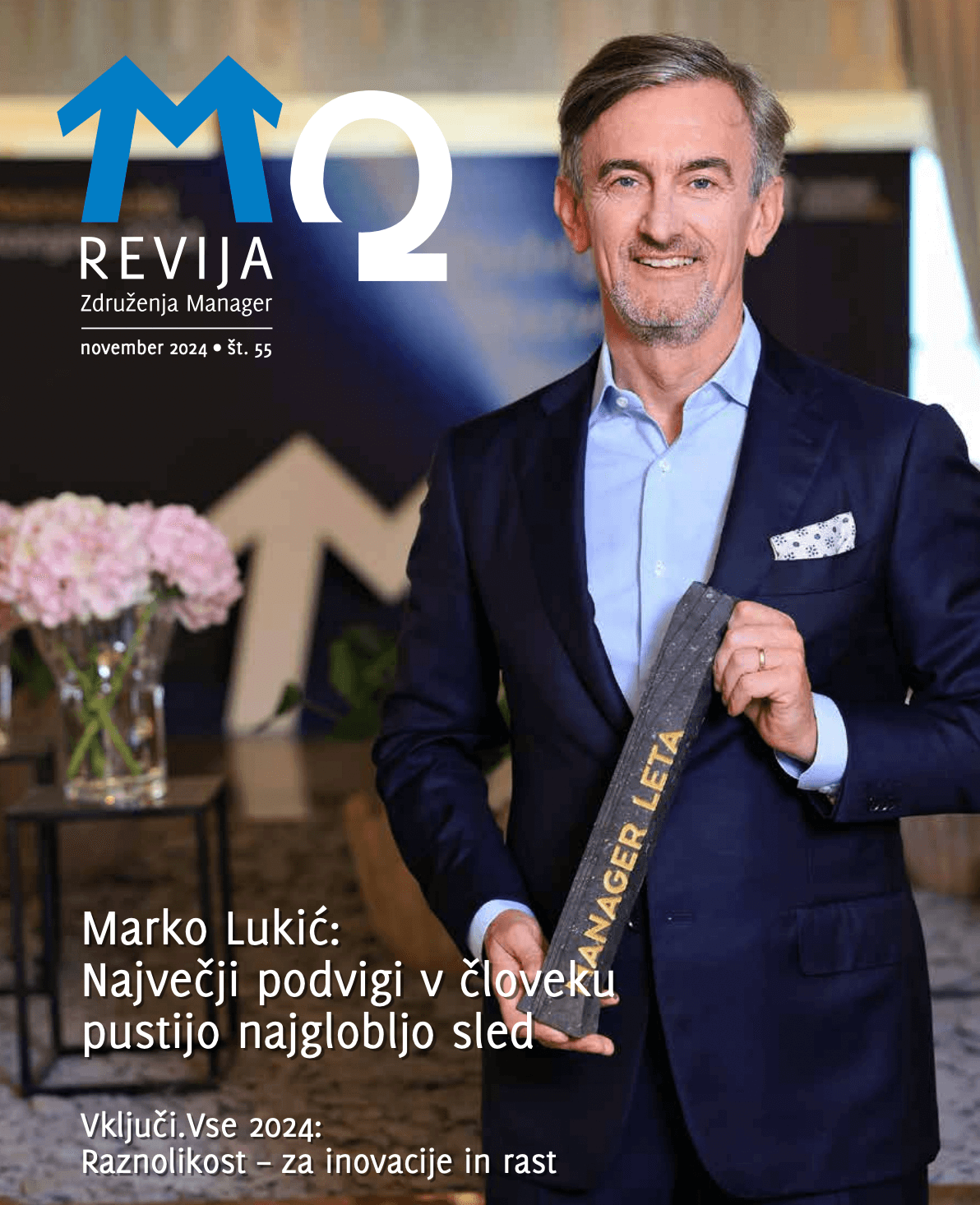
How do you think awards help managers continue with their professional paths?
They mean a lot to managers, as awards elevate them as role models in leadership.
Society needs business role models who are both successful and lead correctly.
This is particularly important for young people who are just starting their careers and will one day have to decide whether they want to become our future leaders.
Some studies suggest that Gen Z doesn’t find leadership or managerial positions as attractive as they used to (read article here), with nearly 70% referring to them as “high stress, low pay”…
I strongly believe young people are very diverse, and we just need to give them time and opportunity.
We must do our best to connect different generations through intense dialogue and mentoring processes. And I think it is very important that we show them role models who can help younger people to become leaders in the new world.
A manager sometimes must decide who to fire…
Yes, that’s why it is so important that we help them develop the leadership skills needed.
What is your final message to the European leadership community?
My message would be that it is important to lead with respect to basic human values, long-term vision, with wisdom, not with ego, and if I may quote one of the slogans of our past Management Congress: with focus on people, planet, profit, purpose, and prosperity.
Maybe today I would also add another P-word: peace.
Thank you very much for your time!



